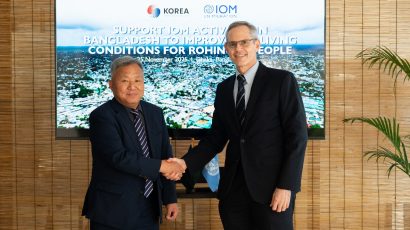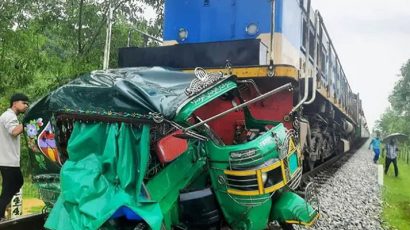
By ZIAUR RAHMAN MUKUL
You might be hearing the term “humanitarian corridor” a lot lately. It became big news when government officials suggested Bangladesh might allow a special route to send help into the Rakhine state of Myanmar, where there’s fighting. Later comments seemed a bit more cautious, showing it’s a tricky subject, we need to understand.
News reports paint a grim picture from Rakhine. Heavy fighting between Myanmar’s army and the Arakan Army-AA group means that maybe two million people are desperately short of food. It seems the Arakan Army controls large areas, and supplies from the rest of Myanmar have been cut off. People there are really starting to suffer from hunger and lack of basic needs.
This is happening right next door to us in Bangladesh. We must remember that our country already provides shelter for about one million Rohingya people in many camps right here in Cox’s Bazar, mainly in the Ukhia and Teknaf areas. Most of them came here fleeing terrible violence back in 2017.
So, what exactly is this “humanitarian corridor” everyone is talking about? Think of it simply as a safe pathway, agreed upon by those who are fighting in a conflict. It’s meant to be a temporary route with no soldiers or weapons allowed. The main purpose is to let ordinary people escape danger safely and allow aid workers to bring in essential help like food, water, and medicine to those who are trapped.
For this safe path to actually work, all the groups involved in the fighting must agree on the exact route and for how long it will be kept safe. It’s usually just for a specific area and for a limited time. The whole point is making sure people and aid can move without being attacked. These safe paths are important because they protect ordinary people caught in wars and let life-saving aid reach those cut off from help. It’s a way to show basic human kindness, but it’s usually just a temporary fix, not a solution to the conflict itself.
However, trying to set up such a path from Bangladesh into Rakhine is filled with huge dangers. Rakhine is an active war zone. Sending aid workers and supplies down that path means putting them at risk of getting caught in the fighting. There’s also a real fear that the violence could spill over the border into Bangladesh. Plus, dangerous landmines or unexploded bombs left from the fighting could be hidden along any route used.
Getting everyone in Myanmar – the military government and the Arakan Army – to agree to this safe path and actually respect the rules will be extremely difficult. There’s a lot of bad history and mistrust between them. On top of that, Bangladesh would have to handle tricky relationships with Myanmar and other countries, while also listening to what people here in Bangladesh feel about taking this step.
Just figuring out how to manage the route would also be incredibly tough. The land near the border has difficult hills and rivers. Roads inside Rakhine might be damaged or simply not exist in the areas needing help most. Getting all the different groups involved – our government agencies, the army, police, international aid groups, and maybe local groups inside Myanmar – to work together smoothly would be a massive challenge. It also needs a lot of money, people, and supplies, resources that might be needed for other problems right here in Bangladesh.
Running this corridor would cost a lot, which could strain Bangladesh’s finances. There’s also the worry that the aid could be stolen or taken by armed groups once it crosses the border. And whenever large numbers of people move, there are concerns about health risks, like the spread of diseases.
Here in Cox’s Bazar, where the Rohingya camps are located, many local people are strongly against this corridor idea. When the Rohingya first arrived years ago, locals welcomed them and shared what they had. But after eight long years, things have become very difficult. Locals complain loudly about feeling unsafe, citing crime and even kidnappings they believe are linked to the camps. Many feel they’ve lost their farmland or jobs because Rohingya refugees are willing to work for much lower wages. They talk about higher prices for food and goods, terrible traffic jams on the roads caused by huge numbers of vehicles going to the camps, and more road accidents. They are also worried about reports of drug dealing and violence breaking out inside the camps. More than anything, local people are deeply frustrated that there is still no real sign of the Rohingya refugees being able to return safely to Myanmar. They fear that opening a new corridor will just bring more burdens and problems onto their communities, without solving the existing ones.
Because these feelings are so strong, many people insist that if Bangladesh ever considers going ahead with this corridor idea, certain things absolutely must happen first. The government must seriously talk to local Bangladeshi communities and listen to their opinions. Any corridor must only be open for a clearly defined, limited time – it cannot be allowed to become permanent. There must be a definite, visible connection between opening the corridor and starting the process of repatriating the Rohingya currently living in Bangladesh back to Myanmar. A rock-solid promise must be made that no new refugees or arrivals will be allowed into Bangladesh through this route under any circumstances. And finally, a strong agreement must be signed and enforced, involving Bangladesh, the Myanmar military, and the Arakan Army, possibly with international groups like the UN watching over it to make sure everyone follows the rules.
So, Bangladesh faces a very difficult decision indeed. There is a clear, urgent need to help the suffering people just across the border in Rakhine. But the risks – to our own nation’s security, our resources, and importantly, to our own communities who are already dealing with so much – are enormous. Opening a path for aid could save lives over there, but doing it without extremely careful planning, strong international support, and truly addressing the deep concerns of the local people here could easily create more problems than it solves. It’s a path that must be considered with the utmost caution.
Ziaur Rahman Mukul,
Humanitarian Worker, Cox’s Bazar,
Email: [email protected]
Date: 04th May-2025









পাঠকের মতামত